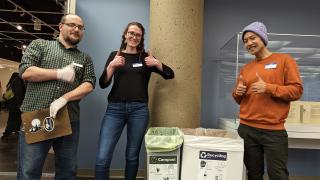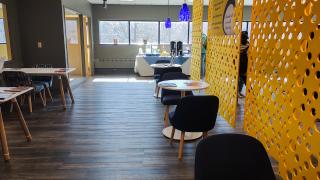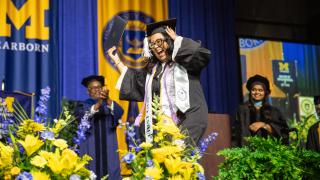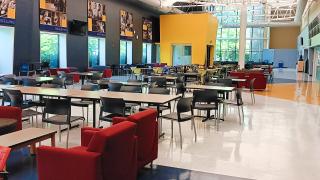
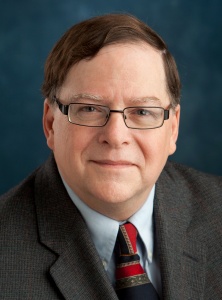
8/17/11 Studio headshot portrait of Robert Fraser.
Fraser accepted. And, once there, he saw opportunities for a stronger Ann Arbor, Flint and Dearborn partnership. After a year or so of actively listening, Fraser began to research resources and ask questions.
“I’d come to the group and say, ‘Can we negotiate a single contract that includes all three campus libraries since we are one university?’ Previously, everything was done on a campus level,” said Fraser, associate director for graduate programs, research and scholarly communication and Mardigian Library librarian. “Something that is standard practice today started with a question. It has stretched the library funding incredibly, allowing us to offer resources for students and faculty otherwise beyond our reach.”
In addition to working to change the thinking behind the library collections on the three campuses to a “one university” approach, he was a champion for faculty governance and promoted technological advancements to enhance teaching and research.
For Fraser’s accomplishments and dedication to his students, he earned the 2016 University Librarian Achievement Award, which is presented for exceptional distinction reflected in active and innovative career achievements in library, archival or curatorial services. He was formally recognized at the Faculty Awards Recognition Dinner at the University of Michigan Museum of Art.
“When I was in high school, the yearbook staff put in the statements about each person. Mine said, ‘Enjoys doing useful things.’ It’s nice to see that people still think that is true,” Fraser said. “But there are so many people who have done so much in the University of Michigan library system. I was floored that the committee had chosen me.”
But he shouldn’t be so surprised, said Associate Professor of English Emerita Sheryl Pearson, who nominated Fraser for the award.
“Bob is an unsung hero. He works modestly behind the scenes and gets little acknowledgement or recognition for what he does. He has long provided teaching and research support for faculty and helped graduate education in countless ways big and small,” Pearson said. “He's really good at helping to bridge ideological divides and advancing toward practical solutions. And he's a man of great integrity.”
He’s the type of educator who will sit in a graduate level course—one he is neither teaching nor taking—so he can better prepare the students he advises.
“I might not have formal training in what they are studying, but I still want students to have an intelligent dialogue with me about their projects,” he said. “I want them to be able to explain what they are doing and why it is important. If they can explain it to me, it will help them explain it in the future to their bosses, peers and others.”
As UM-Dearborn's compliance lead for the responsible conduct of research, he has routinized the teaching of research ethics.
“We are all here to help our students succeed. Part of my job is to enable you to get through this part of your life as quickly as possibly, with the most credible product as possible.”
And, when stepping into his office, he’ll greet guests with a freshly ground mug of Costa Rican coffee (or green tea if you’d prefer) and conversation, while piano sonata music softly plays and a mantle clock—which belonged to Fraser’s father—charmingly chimes in the background.
“We have students who leave work and drive 60, 80, 100 miles for classes or for a research consultation. They are stressed out,” Fraser said. “It’s important to have them sit down in a comfortable chair, have coffee or tea, and relax. It helps to shift gears and create connections much more quickly. ”
Fraser, who has formally studied and taught internationally, enjoys what he does on campus—especially having his office in a library and having the opportunity to interact with students with diverse backgrounds.
“I see the human experience as a great adventure: a choir with many voices,” he said. “Some of the voices are contemporary. Some are historical. But having the opportunity to hear all of those voices enriches me.”

